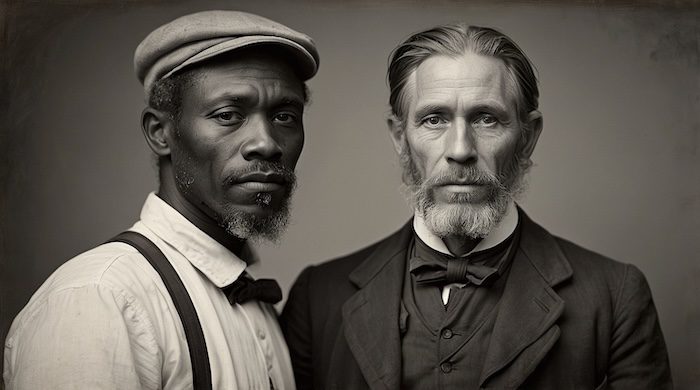
Southern Claims Commission (SCC)
➡️ Established: March 3, 1871, by an act of Congress
➡️ Operational Period: 1871–1880
The Southern Claims Commission (SCC) was created by Congress to hear claims from Southern residents who maintained loyalty to the Union during the Civil War and had property taken or used by the U.S. Army. It was not a charity; claimants had to prove loyalty and prove that property was officially taken for military use.
Who Could File a Claim?

Eligible claimants came from 12 Southern states:
West Virginia, Virginia, North Carolina, South Carolina, Georgia, Florida, Tennessee, Alabama, Mississippi, Louisiana, Arkansas, and Texas.
To succeed, claimants had to demonstrate:
- ➡️ Loyalty to the Union throughout the war, often at great personal risk.
- ➡️ Property Losses officially taken or furnished to the Union Army (horses, crops, wagons, lumber, tools, etc.).
Types of Claims
Allowed Claims
- Found loyal to the Union.
- Losses proven as military requisitions.
Files often contain:
- Full testimonies
- Inventories of goods
special examiner reports
- Treasury Department payment confirmations
Approved claims where compensation was granted.
Disallowed Claims
- Loyalty not sufficiently proven
- Property taken by Confederate forces, or without requisition
- Conflicting witness testimony
Denials were disproportionately common for African American claimants due to racial bias or lack of documentation
Reviewed but denied, often because:
Barred Claims
- Late filing (after March 3, 1873 deadline)
- Procedural or jurisdictional errors
- Incomplete or improper paperwork
Not considered at all, usually due to:
Transfer to the U.S. Court of Claims
- Lawyers were often hired to press the case.
- Courts could review new depositions, examine additional evidence, and occasionally reverse SCC decisions.
Some denied or barred claimants turned to the U.S. Court of Claims.
Testimony and Questions Under Oath
The Southern Claims Commission revised its formal questions several times between 1871 and 1874. These questions, asked under oath, were intended to test loyalty to the Union and verify claims of property loss. In practice, they also drew out deeply personal details of daily life, creating one of the richest archives of Civil War–era testimony, especially for African American claimants.

1871 – Initial Questions
The first version of the SCC questions, introduced in 1871, concentrated on establishing a claimant’s basic loyalty to the Union and verifying property losses. Witnesses were asked to describe where they lived during the war, whether they supported the Confederacy, and what property the Union Army officially requisitioned.
1872 – Revised Questions
By 1872, the Commission refined its approach, adding more probing questions about daily life, relationships with neighbors, and specific encounters with both Union and Confederate forces. These revisions created more context and helped expose contradictions, but also captured vivid community-level detail.
1874 – Final Version
The 1874 revision further expanded the inquiry, asking claimants and witnesses to provide even deeper personal accounts. This version often drew out names of enslavers, stories of survival under occupation, and experiences of formerly enslaved people navigating freedom. Together, the three versions created one of the most detailed archives of Civil War–era testimony in U.S. history.
Locating US Southern Claims Commission
Eligible claimants came from 12 Southern states, namely West Virginia, Virginia, North Carolina, South Carolina, Georgia, Florida, Tennessee, Alabama, Mississippi, Louisiana, Arkansas, and Texas.
| FamilySearch - SCC | ||||
| FamilySearch Wiki | Southern Claims Commission | |||
| Approved Claims | ||||
| Alabama | M2062 | Click to View all 36 Rolls | ||
| The Southern Claims Commission (SCC) microfilm publication M2062 comprises 36 rolls, encompassing 828 approved claims from Alabama residents seeking compensation for property appropriated by Union forces during the Civil War. Each roll is organized alphabetically by county, and within each county, by the claimant's surname. | ||||
| Virginia | M2094 | Click to View all 45 Rolls | ||
| The Southern Claims Commission (SCC) microfilm publication M2094 comprises 45 rolls and contains 931 approved claims submitted by Unionist citizens from Virginia between 1871 and 1880. These claims sought compensation for property—such as livestock, crops, and supplies—confiscated or utilized by the U.S. Army during the Civil War. Each roll is organized by county, and within each county, alphabetically by the claimant's surname. | ||||
| West Virginia | 1762 | Click to View all 3 Rolls | ||
| The Southern Claims Commission (SCC) microfilm publication M1762 encompasses the approved claims submitted by Unionist citizens from West Virginia between 1871 and 1880. This collection comprises 3 microfilm rolls, containing 47 approved claims. he case files in M1762 are organized by county, and within each county, alphabetically by the claimant's surname. In instances where the claimant was deceased or a minor, the files may be listed under the name of an administrator, executor, or trustee. | ||||
| Miscellaneous Letters Received | ||||
| Roll | Date | Roll | Date | |
| 1 | Journal of the Commissioners | 6 | Jan 5, - Dec 23, 1875 | |
| 2 | March 10, 1871 - Dec. 30, 1872 | 7 | Jan 7, - Dec 28, 1876 | |
| 3 | Jan 2, - Dec. 29, 1872 | 8 | Jan 2, - Dec 28, 1877 | |
| 4 | Jan 1, - June 29, 1874 | 9 | Jan 2, 1878 - June 29, 1880 and Other Records Mar 29, 1864 - ca. April 17, 1900 | |
| 5 | July 1, - Dec 31, 1874 | |||
| Letters From and about Special Agents | ||||
| 10 | Avery - Brownlow | 12 | Richmond - Tucker | |
| 11 | Chamberlain - Richards | |||
| NARA -M87 | ||||
| 13 | Geographical List of Claims | 14 | Consolidated Index of Claims | |
| United States. House of Representatives. Commissioners of Claims | ||||
| Southern claims, ca. 1871-1880 | ||||
| National Archive - SCC: Publication in PDF Format | |
| Publication # | State |
| M2062 | Alabama: Approved Claims, 1871-1880 |
| M1658 | Georgia: Approved Claims, 1871-1880 |
| M2094 | Virginia: Approved Claims, 1871-1880 |
| M1762 | West Virginia: Approved Claims, 1871-1880 |
